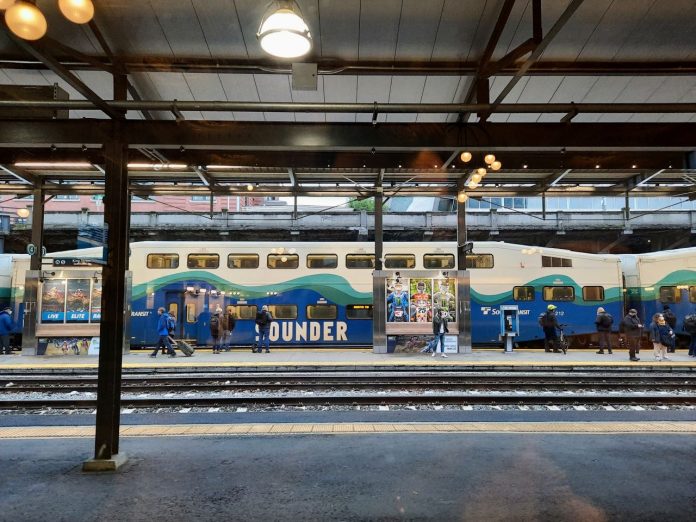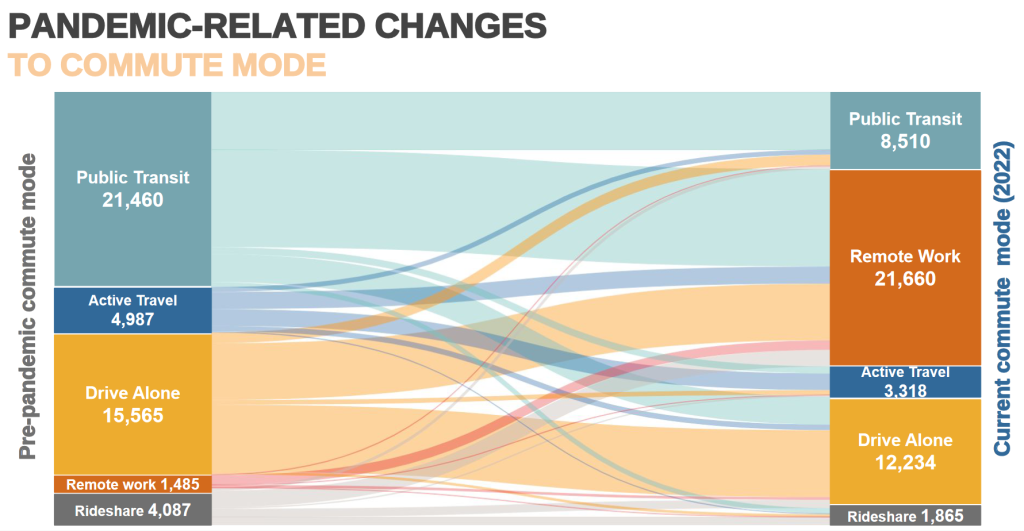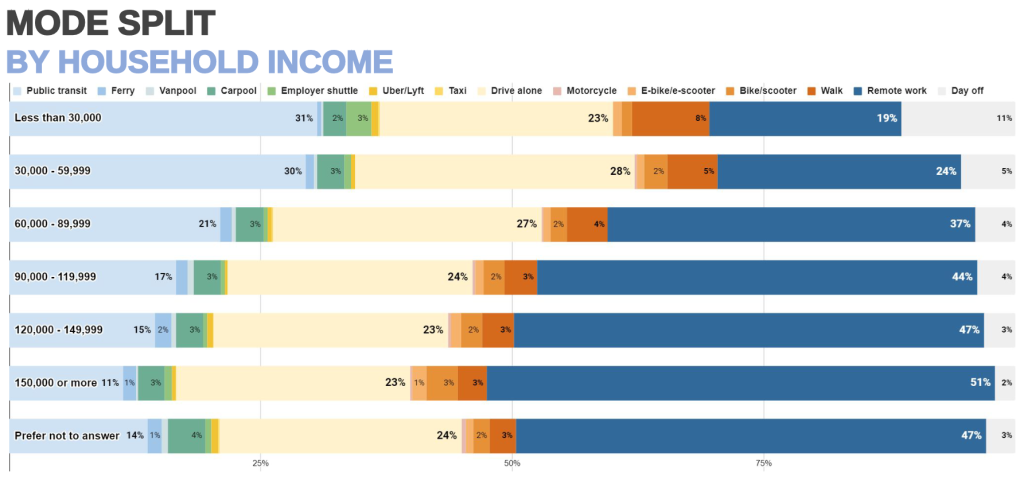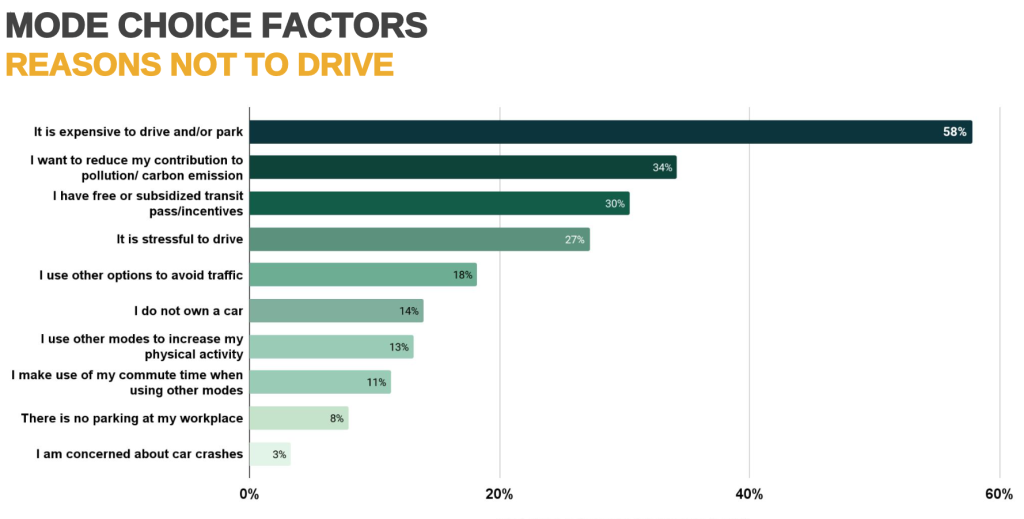
While Saturday and Sunday Link ridership is exploding, Sounder trains still don’t run on weekends.
Sound Transit does not yet run regular Sounder service on weekends, but the agency should certainly change that given demand shown by strong weekend ridership on Link.
By passing the Sound Transit 3 (ST3) ballot measure, Puget Sound area voters demanded an increase in public transit from their elected officials. Substantial progress on this democratic mandate had been achieved before the pandemic despite Covid-19’s catastrophic disruption, and Link ridership is consistently exceeding pre-pandemic highs.
Unfortunately, this progress doesn’t hold consistently across modes, especially Link’s heavy rail counterpart: Sounder. Digging into the data explains why this discrepancy persists, and it all comes down to scheduling and work patterns.
Remote work and transit culture
Link is surpassing its pre-pandemic ridership due to weekend trips, specifically 2019 weekend ridership was 5.1 million, while June 2022 to June 2023 it rose to 7.4 million, a 45% increase. Conversely, Link’s weekday ridership has not yet recovered to pre-pandemic highs. Why?
A 2022 survey of CTR affiliated workers and employers in the greater Seattle area, conducted by Commute Seattle, shows remote work rocketed due to the pandemic, while public transit fell from first to third place, tumbling behind driving alone.

A preference for cars rather than transit does not explain this shift: the share of drivers decreased along with transit commuters. Further data from the 2017 US census revealed Seattle’s transit was more popular among those earning more than $75,000 a year than those earning less, meaning workers possessing the financial means to drive alone still chose transit. When cross-referenced with current commute modes by income — where high earners are roughly twice as likely to work remotely as low earners — remote work appears to have accounted for the greatest share of transit’s declined use.

In combination with Link’s increased weekend ridership, these data illustrate why fast reliable transit outside peak commute hours is essential: many users are now working from home, and they still need transportation services. A culture of transit use beyond commuting has formed, and Sound Transit should be proud — it is one thing to build rails, it is another to build culture.
Expanding opportunity with Sounder
Beyond meeting the needs of wealthy former commuters, increasing weekend service has the potential to extend opportunity far beyond Seattle’s urban core. Existing services such as Sounder can and should pull more weight toward a more sustainable and equitable future.
Currently, Sounder caters exclusively to those working typical office hours, excluding workers whose schedules operate outside this narrow window as well as people making non-work trips. Were Sounder to offer reliably consistent weekend service, it would provide low-income peripheral residents a cheaper, more eco-friendly means of accessing a wider variety of education and job opportunities in Seattle’s urban core.
While Sound Transit also operates “ST Express” bus service, the drop-off in ST Express ridership since the pandemic — when contrasted with Link’s stellar performance — demonstrates the region’s people prefer rail to bus transit options. Having personally switched from a rail to bus commute, I can testify to why: rail journeys are smoother and more comfortable. They enable riders to relax and increase their productivity, whether starting the day with a calmer mind or working on the journey itself. The cramped start-stop jerking of buses stuck in traffic robs passengers and employers of these comforts and productivity increases, not to mention that buses are less fuel-efficient per-passenger mile than trains.
Commute Seattle’s survey data shows that weekend Sounder service would unlock opportunities for low-income residents. With gas prices in Washington at an all-time high, it’s not difficult to see why the expense of driving is the number one factor Seattle residents are choosing not to drive.

Factor in that households earning under $60,000 are the most likely to use transit and least likely to work from home, and the ridership gains weekend service would provide are plain to see.
Equity, climate, and transit
In Washington, inequality has exploded since the pandemic, and the climate crisis is coming home through increasingly frequent, dangerous, and costly wildfires. More equitable and efficient transportation represents a small but important step in addressing those issues. If the state is ready to spend $14.8 billion on highways from now to 2029, it has the money to upgrade the services which have the potential to uplift and integrate communities across race, class, and space while lowering their carbon footprints.
Sound Transit has an online survey on Sounder S Line priorities through October 29. You can share your views about more Sounder service.

Collin Reid
Collin Reid is an educator who moved to the Central District of Seattle in 2024 after having lived and worked in St. Petersburg Russia for eight years. His background in political science and international experiences led him towards urbanism and transportation as the foundational elements of society. He is a member of the Seattle Democratic Socialists of America.
